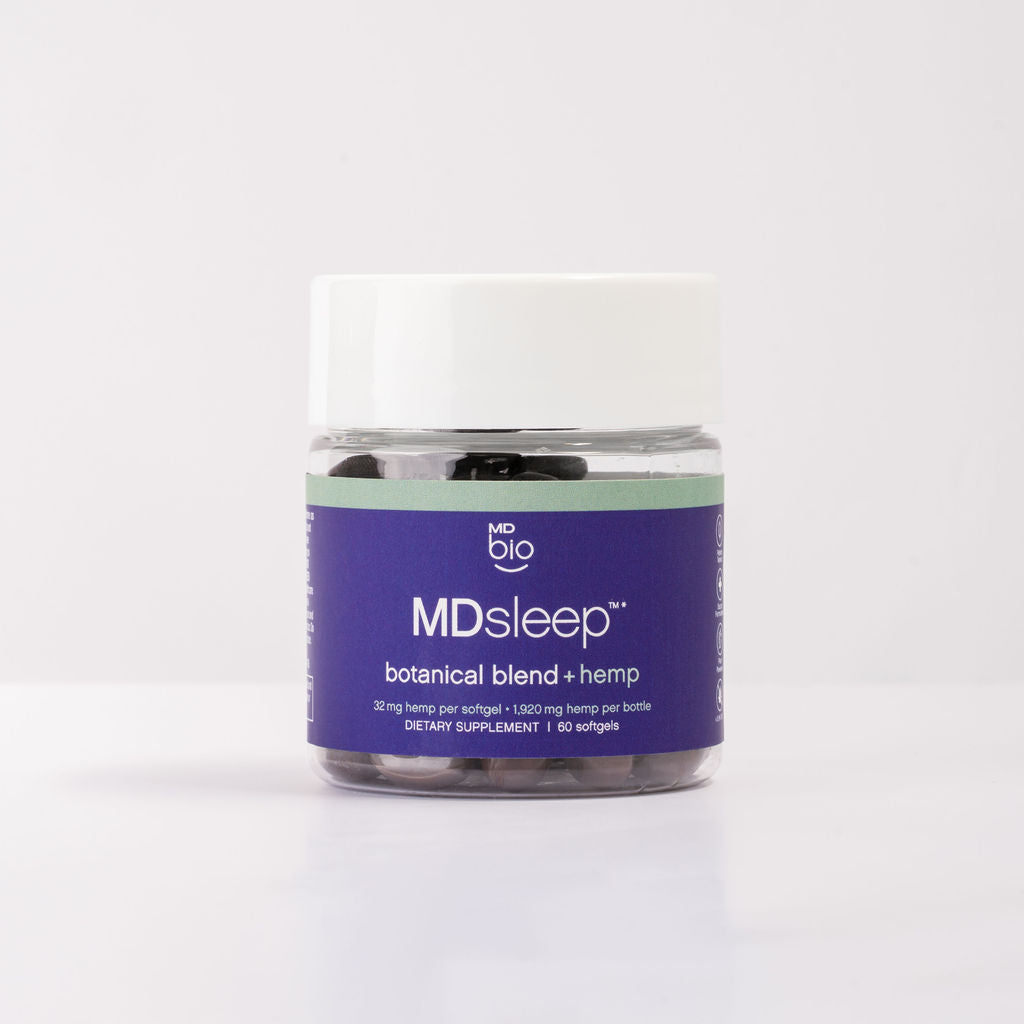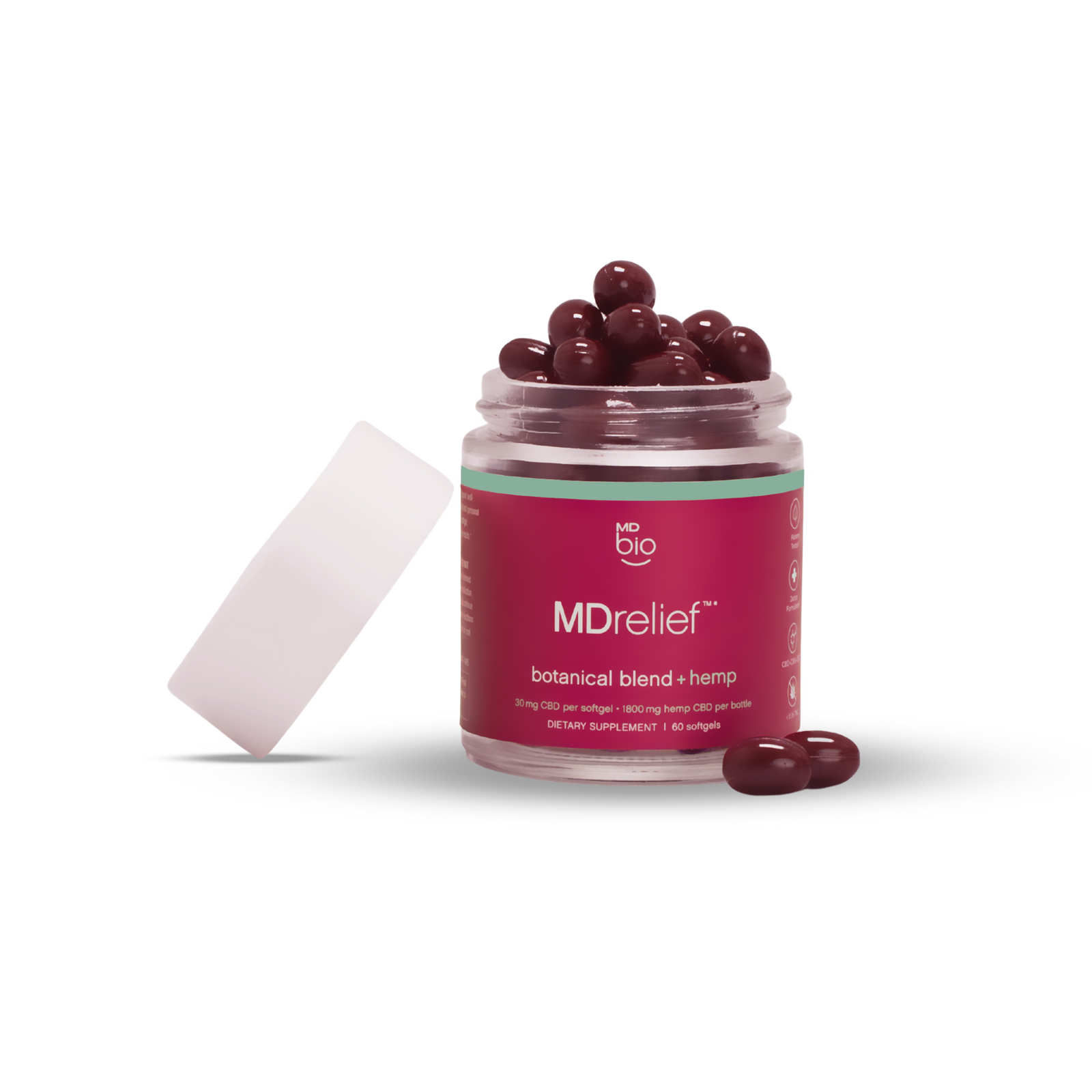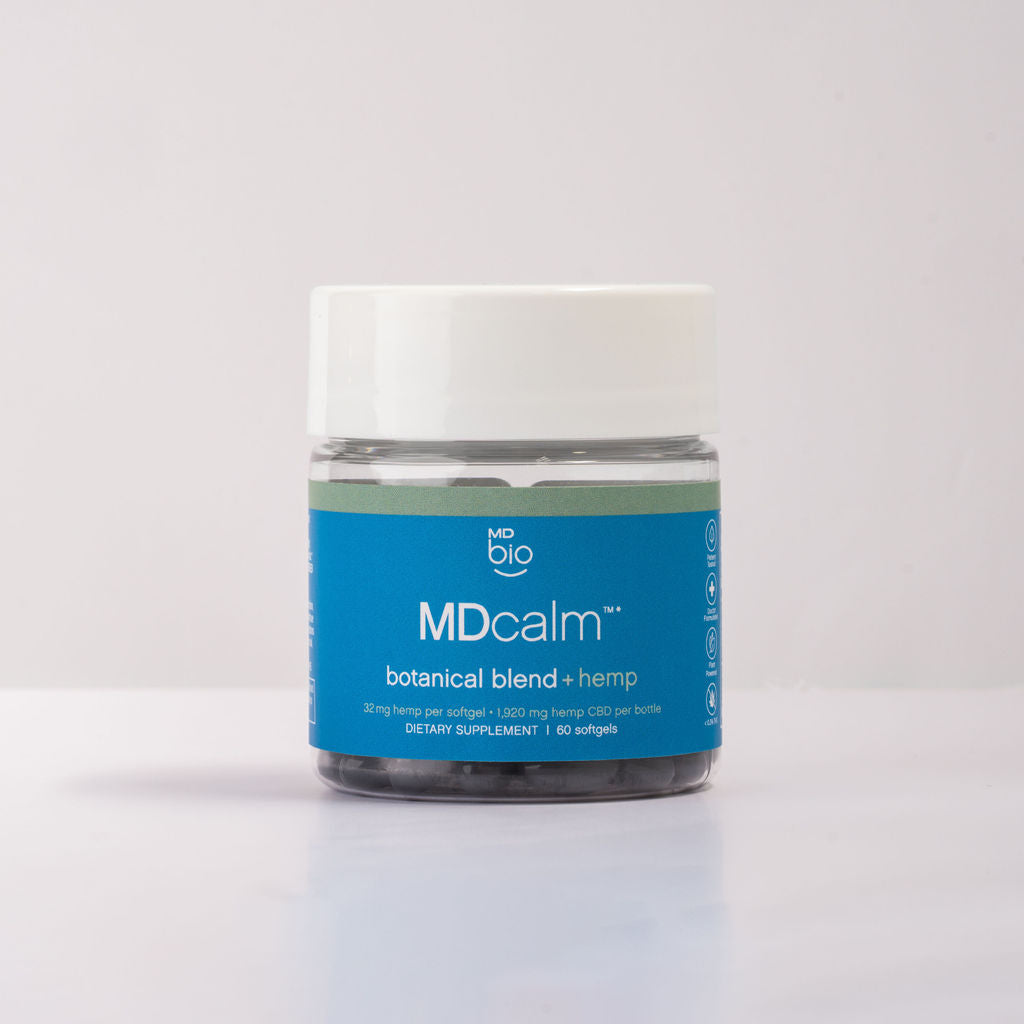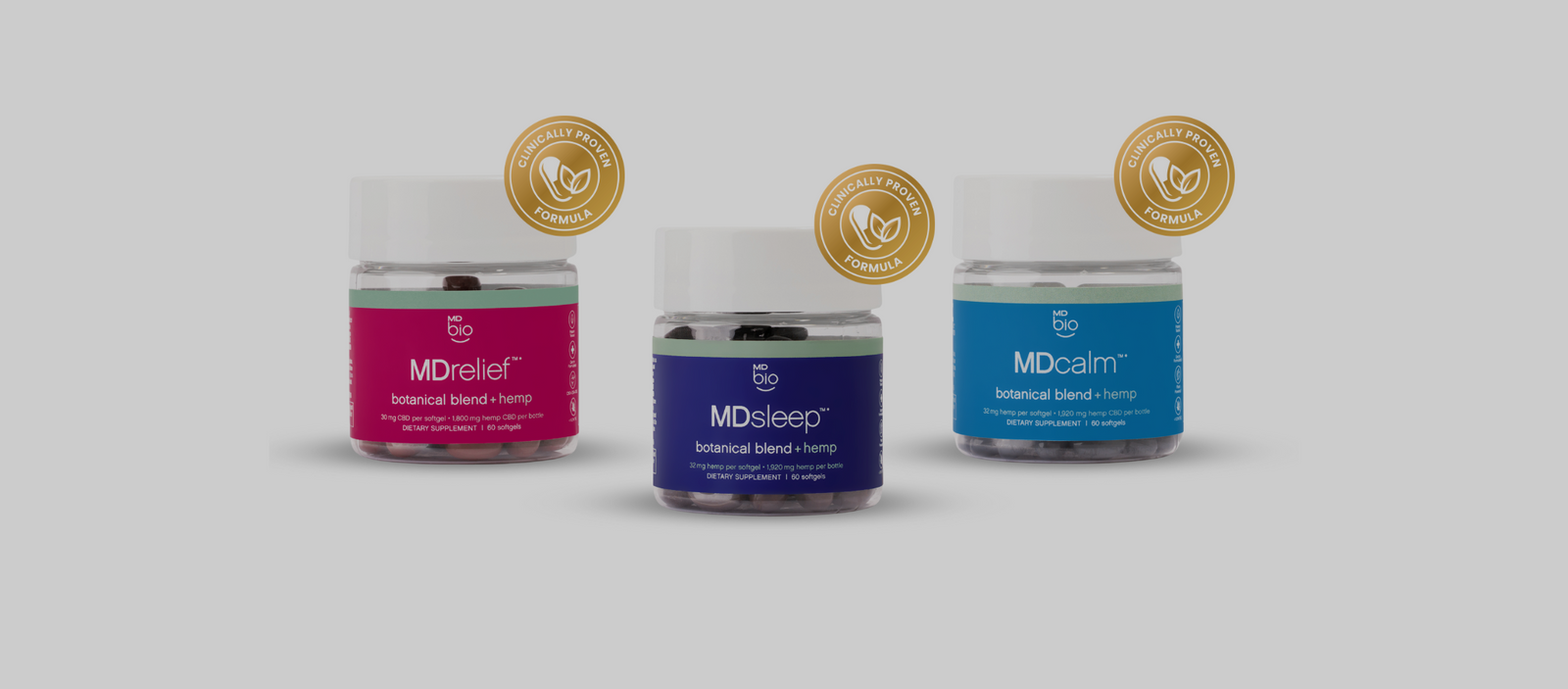
Chances are you've heard of GABA if you're interested in wellness. This naturally-occurring chemical has been gaining prominence recently as researchers and individuals are discovering that it may be a critical component of a healthier lifestyle – both mentally and physically.
But what does GABA stand for, and what does GABA do? While scientific research is taking steps to understand the core properties of this chemical, individuals are discovering impressive benefits by getting more GABA into their diet through health supplements. Although it occurs naturally in the brain, GABA can be hard to find in foods – this makes it even more important to boost your levels if you believe you're suffering from a GABA deficiency.
Our guide will cover:
- What does GABA stand for?
- What does GABA do?
- Which conditions is a GABA deficiency linked to?
- Core gamma-aminobutyric acid benefits
- How you can increase your GABA levels!
Learn all you need to know about what GABA does below.
What Does GABA Stand For?
Let's start with the basics – what does GABA stand for?
The acronym is short for gamma-aminobutyric acid. This doesn't explain much unless you're a scientist, so let's break it down into each component first.
- Gamma: this refers to its action on the brain's gamma receptors. These receptors play a critical role in mediating the immune system.
- Amino: this part of “what does GABA stand for” means that it's an amino acid. These are naturally occurring molecules that combine to create proteins. Life on Earth is completely dependent on amino acids!
- Butyric: in scientific terms, this to the atomic makeup of the acid (a neatly arranged mixture of hydrogen, carbon, and oxygen, like so much of life). In plain language, “butyric” actually just means “like butter.”
- Acid: natural acids are everywhere in our bodies. They regulate many of our processes – although the word sounds nasty, there's nothing to be afraid of.
When you put these elements together, you arrive at a compound that regulates brain activity, may play a critical role in a healthy immune system, and can be included in healthy dietary supplements. Purported gamma-aminobutyric acid benefits are wide-ranging and may include better sleep, reduced anxiety, lower risk of seizures, and much more. You can find out more about what does GABA do in terms of health benefits further in the article.
For now, we're not quite done with the science. Let's move on from what does GABA stand for to its role in the human brain.
What Does GABA Do in the Brain?
GABA's primary role is in mediating certain types of neural activity. Here's how it works.
Inhibitory Neurotransmitter
GABA is an inhibitory neurotransmitter. Neurotransmitters are relays that send messages throughout the brain and around the body. They're responsible for everything from thoughts to muscular movements.
An inhibitory neurotransmitter “blocks” chemical messages and reduces activity in the brain. Certain chemical signals can lead to overstimulation and hyperexcitation when the brain is processing an extremely high volume at once.
It's hard to process such high levels. This difficulty manifests as physical symptoms including stress, anxiety, and hyperactivity. It can even lead to issues such as seizures.
This is why inhibitory neurotransmitters play such an important role in the brain. So what does GABA do to prevent chemical signals from becoming overwhelming? It differs slightly depending on which variant we're talking about. In terms of what does GABA stand for, there are two main types – GABA-A and GABA-B.
GABA-A and GABA-B
These compounds play a fairly similar role – both act as inhibitory neurotransmitters. GABA-B tends to be more widely discussed, although supplements containing GABA typically boost levels of both.
Here's the difference at a glance.
- What does GABA stand for? (GABA-A) – this compound is responsible for “rapid-response” inhibitory signals. These act quickly to reduce activity in certain areas of the brain.
- What does GABA stand for? (GABA-B) – this compound mediates long-term inhibitory signals. These produce a more sustained slowdown of chemical signals.
Each is important because the brain needs both short and long-term alleviation from overwhelming signals. However, it's GABA-B levels that gain the most when using supplements to boost your GABA levels. Purported gamma-aminobutyric acid benefits include improved long-term mental stability and consistently reduced stress and anxiety levels, which is why the slow-acting but longer-lasting inhibitory signals are so important.
Excitable Neural Circuits
The brain can process incredible volumes of information at once. However, there are limits. Neural circuits are “excitable,” meaning activity stimulates them. This is why we start feeling sharper and more alert when we perform cognitive activities like reading a book or having an interesting conversation.
However, many people will be familiar with the sensation that their brain is being overwhelmed or overloaded. This could be:
- Information overload. This occurs when we're bombarded with more information than we're able to process. This doesn't necessarily mean trying to understand difficult academic concepts – it can be emotive information, such as finding out that a relationship is ending. This can overwhelm the brain and overexcite our neural circuits.
- Sensory overload. This applies to numerous stimuli – any of the senses can be overloaded. Sounds, bright lights, and touch can all cause our neural circuits to go into overdrive and make it difficult for us to process what's happening.
- Overload due to a condition. This can be a combination of the previous two factors – many people with neurological conditions struggle to process high volumes of chemical signals. This leads to confusion, fatigue, and distress.
When the brain is overwhelmed with information, it's referred to as hyperexcitation.
Preventing Hyperexcitation
One of the key purported gamma-aminobutyric acid benefits is preventing hyperexcitation. When neural networks become overstimulated, the brain goes into overdrive and we can “shut down” as it becomes overwhelming. An inhibitory neurotransmitter counteracts this by blocking signals to the brain.
Take the example of sensory overload – an overwhelming volume of stimuli can be made bearable by increased levels of inhibitory neurotransmitters. This lets us process this information in a more sensible way and respond without becoming overwhelmed.
In terms of what does GABA do, this is one of its most appealing potential benefits. Many people experience hyperexcitation due to neurological or nervous conditions. Increased levels of inhibitory neurotransmitters may be extremely beneficial in these cases.
What Does GABA Do In Practice?
The practical application of gamma-aminobutyric benefits is linked to keeping GABA levels consistent. There's limited understanding of why some people experience low levels of gamma-aminobutyric acid, although some workhas identified genetics as one cause of a long-term deficiency.
However, anyone can experience low levels of the chemical. Identifying that you don't have enough GABA in your system is usually identified by understanding what does GABA stand for and do – when you know that it prevents hyperexcitation, you know what to look for. If your brain consistently becomes overwhelmed or overloaded, it may be because there's a deficit of inhibitory neurotransmitters.
Raising your levels may help to alleviate these symptoms, which is why supplementsare highly recommended for anyone looking to achieve a more consistent, stable cognitive state.
Conditions & Issues Linked to GABA Deficiency
Below are some of the most common conditions and issues that gamma-aminobutyric acid benefits may help counteract.
Racing Thoughts
Racing thoughts are one of the most common symptoms of hyperexcitation. They indicate that the brain is receiving an overwhelming volume of chemical signals. Inhibitory neurotransmitters regulate these signals and help people order their thoughts – consistent GABA levels may combat this problem.
Anxiety
Anxiety disorders are increasingly prevalent in the United States and across the world. Around 1 in 5 U.S. adults experiencemajor symptoms of an anxiety disorder each year.
Racing thoughts are a characteristic of anxiety disorders. Cognitive and sensory overload are also extremely common in anxiety disorders, while poor sleep is both a symptom of and a contributor to increased anxiety.
More stable GABA levels may help alleviate anxiety disorders in this way. Patients with anxiety may be among those who stand to gain the most from gamma-aminobutyric acid benefits.
Insomnia
Insomnia is linked to several other conditions listed here but can be a condition in its own right. Insomnia is often characterized by an overactive mind, with the brain struggling to “shut down” for sleep as it should. Sleep deprivation, in turn, makes it harder for the brain to process ordinary chemical signals.
Insomnia patients may, therefore, benefit from an inhibitory neurotransmitter. When it comes to what does GABA do, the causes of insomnia match the profile of hyperexcited neural circuits very closely.
Stress
Virtually everyone experiences stress. We mentioned information overload earlier – this is commonly associated with stress. Stressful situations may include work, relationships, family, and any number of situations where things are or could be going wrong.
Stress is characterized by being unable to stop thinking about an unpleasant situation. This means that a high volume of chemical signals is constantly flooding the brain with thoughts connected to stressful situations. Inhibitory neurotransmitters may help reduce this flood of thoughts and mitigate the negative effects of stress.
High Blood Pressure
High blood pressure is connected to many of the conditions listed above. Poor sleep and stress can both increase blood pressure.
High blood pressure can contribute to numerous illnesses, with perhaps the most serious being the increased risk of a heart attack. Addressing the causes of high blood pressure is one of the most vital potential gamma-aminobutyric acid benefits for this reason.
Fatigue
Hyperexcitation leads to exhaustion. In this way, the brain works similarly to the body – a period of intense exertion tires your body out. Likewise, consistently overexcited neural circuits tire your brain out. This makes it difficult to understand or complete ordinary cognitive tasks such as problem-solving and considering questions.
Mental fatigue can also have very dangerous consequences, for example, if you need to drive a car. This is another reason many people are discovering gamma-aminobutyric acid benefits to potentially help balance their minds while getting through the day.
Seizures
Seizures are an extreme consequence of hyperexcitation. If the brain becomes completely overloaded, it begins to shut down. This means that the ordinary signals it sends around the body to keep us moving and conscious aren't sent.
This can cause seizures. The brain needs to maintain a balanced state to send the right signals around the body – this relies on not being overwhelmed by a wave of adverse information overwhelming it. Inhibitory neurotransmitters play a vital old in mediating this type of overload.
Attention Deficit Hyperactivity Disorder (ADHD)
ADHD is a common condition partly characterizedby hyperactive behavior and difficulty remaining focused on a single task. While there is no strong established link between ADHD and low GABA levels, reduced levels of chemical impulses in the brain may be helpful in combating a lack of focus.
Depression
Depression is a pervasive condition in the U.S. and is often comorbid with anxiety, insomnia, and other conditions listed above. In terms of what does GABA do, helping to alleviate the negative cycles associated with hyperexcitation may be useful in combating depression.
This should be considered alongside other behaviors and supplements that may help to improve mood and calm the mind.
Gamma-Aminobutyric Acid Benefits
Now that we've covered what does GABA stand for and the conditions that may be associated with a deficiency, it's time to consider what does GABA do as part of a balanced lifestyle. Below are some of the most important potential gamma-aminobutyric acid benefits.
Improved Mood
Reducing stress is vital to consistently improve your mood. As noted, stress tends to overwhelm the brain by repeatedly flooding it with negative thoughts. Inhibitory neurotransmitters may help prevent this.
Likewise, insomnia can lead to sleep deprivation, which can have a terrible effect on mood and even lead to psychosis. One of the key potential gamma-aminobutyric acid benefits is mitigating the causes of insomnia. As such, it may help indirectly improve mood by helping provide better sleep.
Calm Mind
Many people concerned with their wellness are discovering the benefits of meditation and reconnecting with nature. However, moving away from our daily stresses and finding time to meditate can be difficult at first – we often find that our thoughts are racing and we're unable to switch off and enjoy a calmer life.
Inhibitory neurotransmitters play a critical role in calming neural excitement. Increasing the level of GABA in your brain may help with “switching off” and discovering the benefits of meditation and other therapeutic activities.
Stronger Immune System
When we discussed “what does GABA stand for”, we noted that “gamma” refers to the brain's gamma receptors. These are a type of Fc receptor and are concerned with mediatingthe immune system and protecting the body against disease.
While it's known that mental well-being and physical well-being are deeply linked (especially regarding vulnerability to illnesses), we don't fully understand how the relationship works. However, we know that GABA interacts with these receptors. By inhibiting chemical signals that overwhelm the brain, one of the key gamma-aminobutyric acid benefits, it may play a role in regulating a strong immune system.
Increased Focus
Most thoughts that overwhelm our minds are distracting and negative. Inhibitory neurotransmitters can help prevent these thoughts from overexciting our neural circuits, thereby helping us increase focus on the task at hand. Supplements containing GABA may be useful for studying or focusing on work in this way.
Better Sleep
Racing thoughts, anxiety, and generally high levels of brain activity are key causes of insomnia. An inhibitory neurotransmitter such as GABA may help reduce these stimuli and allow people to get a better night's sleep.
Improved Long-Term Health
Many symptoms associated with an overwhelmed brain have a negative effect on the body, e.g. by engendering high blood pressure. One of the most important long-term gamma-aminobutyric acid benefits may, therefore, be in improving our long-term health by helping prevent some of the causes of high blood pressure.
What is a Good Source of GABA?
One reason people wonder “what does GABA stand for” is because it's included in some of the most beneficial supplements available today. Understanding what does GABA do helps us realize why it's such an important component of our diet.
Here's the tricky part, though – it doesn't turn up in many foods. So how do I boost my GABA levels?
GABA Supplements
The best way to increase your GABA levels is to use a supplement containing GABA and other beneficial ingredients. Ingredients like L-theanine, hops extract, valerian root, and hemp may aid the body and mind in similar ways and are recommended parts of a healthy diet and lifestyle.
What Food is Highest in GABA?
Very few foods are rich in GABA. While fresh fruit, vegetables, and nuts may be somewhat beneficial (and are a great part of your diet anyway!), GABA is mostly found in fermented foods, especially those including soy. Miso and kimchi are both good choices.
Final Thoughts
If you believe you're experiencing a GABA deficiency, the best way to combat this is with organic supplements made from other mutually beneficial ingredients. The MDsleep supplement helps increase your GABA levels and contains other healthy, organic ingredients that may help combat many of the symptoms described above.
Discover more about gamma-aminobutyric acid benefits firsthand – give it a try today.
- Unlock Your Immune Potential: Explore the 8 Best Supplements To Boost The Immune System Now!











